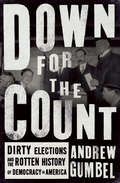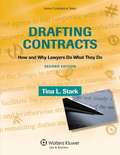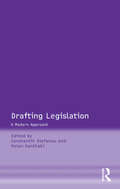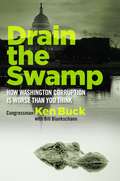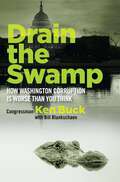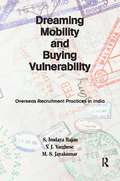- Table View
- List View
Down for the Count: Dirty Elections and the Rotten History of Democracy in America
by Andrew GumbelThe updated edition of Steal This Vote—a rollicking history of US voter suppression and fraud from Jacksonian democracy to Citizens United and beyond. In Down for the Count, award-winning journalist Andrew Gumbel explores the tawdry history of elections in the United States. From Jim Crow to Tammany Hall to the Bush v. Gore Florida recount, it is a chronicle of votes bought, stolen, suppressed, lost, miscounted, thrown into rivers, and litigated up to the Supreme Court. Gumbel then uses this history to explain why America is now experiencing the biggest backslide in voting rights in more than a century. First published in 2005 as Steal This Vote, this thoroughly revised and updated edition reveals why America faces so much trouble running clean, transparent elections. And it demonstrates how the partisan battles now raging over voter IDs, campaign spending, and minority voting rights fit into a long, largely unspoken tradition of hostility to the very notion of representative democracy. Interviewing Democrats, Republicans, and a range of voting rights activists, Gumbel offers an engaging and accessible analysis of how our democratic integrity is so often corrupted by racism, money, and power. In an age of high-stakes electoral combat, billionaire-backed candidacies, and bottom-of-the-barrel campaigning, this book is more important than ever. &“In a riveting and frightening account, Gumbel . . . traces election fraud in America from the 18th century to the present . . . [the issues he] so winningly addresses are crucial to the future of democracy.&” —Publishers Weekly, on Steal This Vote
Down in the Flood: A Novel (Danny Chaisson Series)
by Kenneth AbelAll the top crime writers agree that Kenneth Abel is a spectacular writer: "A gripper all the way," says Elmore Leonard. "A stunning achievement," declares James Lee Burke. "Brilliant," says Robert B. Parker. And now with Down in the Flood, former New Orleans prosecutor Danny Chaisson is back in a third electrifying thriller.Danny Chaisson's latest case is bid-rigging. But as his investigation proceeds, a gathering storm named Katrina blasts his world apart.Surrounded by death and the destruction of the city he loves, Danny searches for one man who'd trusted Chaisson to guard his identity when he agreed to testify before a federal grand jury investigating corruption in the city's construction industry. But someone has leaked the identity of this crucial witness, and as the city begins to empty before the approaching storm, Danny learns that a pair of corrupt policemen hired by the wealthy defendants in the case have begun stalking his client.Cut off from escape, and unsure whom he can trust, Chaisson's client has gone into hiding in the city's Ninth Ward, where he grew up. Now Danny must race against time, a pair of relentless professional killers, and the rising flood waters to save the man who'd counted on him.But can Danny save one man as a whole city dies?
Downfall: The Demise of a President and His Party
by Andrew HackerTake a tour through the elections since 2016 and the Republican Party&’s strongest stances to understand the impending defeat of Donald Trump in the 2020 Presidential election. Downfall does not offer a prediction or wishful thinking—it affirms a certainty. Veteran political scientist Andrew Hacker&’s vast array of evidence points to the conclusion that Donald Trump will not be reelected, regardless of which Democratic candidate opposes him. Based on a close analysis of midterm and special elections, Hacker has found that Trump&’s so-called base is shrinking and that a strong majority of voting Americans want Trump out of office. Alongside comments from Republican Party members on why they stand with their party, Hacker autopsies their most steadfast viewpoints to illustrate from where these opinions stem and why Trump supporters provide him with votes. This includes an examination of Republican positions on: Gun controlAbortion and women&’s rightsSexism and gender disparitiesRacism and affirmative actionLGBTQ rightsClimate Change And more Both a look back at the years since Trump&’s election and a glimpse into what lies ahead for politics, Downfall provides an optimistic outlook that the most divisive leader in the US&’s history will join the ranks of one-term presidents.
Doña Perpetua: El poder y la opulencia de Elba Esther Gordillo
by Arturo Cano Alberto AguirreNuevas revelaciones sobre el polémico caso de Elba Esther Gordillo. Las llamadas de dos secretarios de Estado, que la invitaban a compartir el pan y la sal, hicieron que Elba Esther Gordillo cambiara su itinerario. En lugar de volar a Guadalajara, donde la esperaba la cúpula de su "república romana", su avión aterrizó en Toluca. Ahí fue detenida. Los cargos: lavado de dinero y delincuencia organizada. Las autoridades dieron a conocer la lista de sus mansiones, de las exclusivas tiendas donde se vestía con cargo a las cuotas de los maestros y de sus millonarias transferencias bancarias. Muchos de esos datos aparecían ya en este libro, publicado originalmente en 2008, y que hoy se presenta en una edición actualizada. Desde su aparición, Doña Perpetua se convirtió en un texto de referencia, pues se trata de la biografía más completa de un personaje que influyó en la política nacional a lo largo de poco más de cuatro sexenios. Empeñado en la restauración del viejo presidencialismo, el gobierno de Enrique Peña Nieto -beneficiario de la maquinaria electoral del magisterio- lanzó una advertencia a otros actores por medio de la detención de Elba Esther Gordillo, la cabeza más impresentable de los "poderes fácticos". La llegada de la Maestra al poder se dio gracias a
Dr. Alan R. Moritz and Forensic Pathology: Tales That Dead Men Tell
by Rob MoritzForensic science has become a mainstay of popular culture on television, in movies, books, and podcasts. Dr. Alan R. Moritz (1899-1986) was a highly influential figure in the development of the field of forensic science as we know it today.Dr. Alan R. Moritz and Forensic Pathology: Tales that Dead Men Tell, written by Dr. Moritz’s journalist grandson Rob Moritz, recounts his life and career from personal papers and correspondence, interviews, newspaper accounts and other sources, including archived materials from Harvard Medical School, the Rockefeller Foundation, Case Western Reserve University and the University Hospitals of Cleveland. Chapters chronicle more than a half-century of ground-breaking research and high-profile investigations, including some of the 20th century’s most infamous cases. This includes the assassination of President John F. Kennedy, the Sam Shepherd case, the Cocoanut Grove nightclub fire, the Attica prison riots and the Texas Tower sniper, as well as his contributions to the well-known Nutshell Studies of Unexplained Death. Dr. Moritz, the inspiration for the first on-screen forensic scientist, is credited with being one of the most prominent pioneers of the last century, helping to move forensic medicine from the political jurisdiction of untrained local coroners to a respected scientific discipline that fascinates the public.The book also details Dr. Moritz’s travels, during which he experienced some of society’s darkest chapters. This includes an infamous lynching during the “Red Summer” of 1919, the rise of Nazi Germany and the degradation of apartheid in South Africa, all of which influenced and shaped his worldview. Highlights of Dr. Moritz’s work, recounted in detail, include career stops at Case Western Reserve University in Cleveland and Harvard Medical School in Boston. Coverage details his most salient and well-known research—as well as insightful anecdotes and stories that demonstrate Dr. Moritz’s character and the development and evolution of his scientific views over the years.This book: Profiles the life of a well-known and impactful figure in the advancement of forensic pathology’s public perception and practices in the United States. Provides background on Dr. Moritz’s seminal work, the article Classical Mistakes in Forensic Pathology Is of interest to medical practitioners, history of science buffs, and forensic practitioners interested in the early history and development of forensic pathology as a discipline Dr. Alan R. Moritz and Forensic Pathology fills in a missing chapter on the life, research, and lasting legacy of Dr. Moritz, providing insight into the development of modern forensic pathology practice by examining the momentous contributions and character of one of its true pioneers.
Dr. Bot: Why Doctors Can Fail Us—and How AI Could Save Lives
by Charlotte BleaseHow does AI compare to a doctor when it comes to saving lives? Doctors are under-resourced and face unprecedented levels of stress, with rising patient numbers and ever developing medical knowledge. But at the same time, they are all too human, prone to racial, class and social biases that affect the care patients receive. Can we improve patient experience and alleviate the burdens of doctors at the same time? In this groundbreaking study, Charlotte Blease reveals how AI, if handled with care, could emerge as the most reliable physician in history. Drawing on interviews with authorities in AI, doctors and patients, Blease shows how technology – despite some resistance – is already making a difference. From diagnosis and second opinions to treatment and aftercare, AI has the potential to revolutionise our healthcare.
Dr. Martin Luther King Jr. on Love
by Dr. Martin Luther King Jr.A remarkable compilation of Dr. Martin Luther King Jr.’s reflections on love and its transformative power—a stellar addition to Dr. King’s archives published exclusively by HarperCollins.“I have also decided to stick with love for I know that love is ultimately the only answer to mankind’s problems.”—Martin Luther King Jr.Dr. King, one of the greatest civil rights leaders in history, wrote and reflected frequently about love. He understood its transformative power and the essential role love played in his mission as the catalyst for positive change.Now for the first time, in this project of the Dr. King archives published exclusively by HarperCollins, readers will get access to many of King’s writings on love—compiled in a deeply insightful, moving and transformative work of literature. Each section of the book is accompanied by brief introductory editorial remarks that reflect on the historical context of each speech, sermon, and piece of writing, and will further enrich the reader's understanding and appreciation of Dr. King's timeless wisdom.Love is explored, championed, and debated around the world. It is the central concern of many religious practices. Readers are deeply curious about its nature. C.S. Lewis' The Four Loves, Thich Nhat Hanh's How To Love, or even bell hooks' All About Love showcase that readers and writers share this universal longing and fascination to uncover love’s mysteries.This book represents the first volume in an "On" series from the MLK archives, featuring MLK on various subjects. By grouping his work by subject, readers will get a glimpse at the evolution of his ideas and understand the circumstances in which that theme emerged to lead his concerns.
Dr. Martin Luther King Jr. on Love \ Sobre el amor (Spanish edition)
by Dr. Martin Luther King Jr.Esta recopilación inédita que recoge las reflexiones del Dr. Martin Luther King Jr. sobre el amor y su poder transformador. Una adición especial a los archivos del Dr. King, publicada exclusivamente por HarperCollins. «Yo también he decidido quedarme con el amor porque sé que, en última instancia, el amor es la única respuesta a los problemas de la humanidad». —Martin Luther King Jr. El Dr. King, uno de los mayores líderes de la lucha por los derechos civiles de la historia, escribió y reflexionó con frecuencia sobre el amor. Entendía su poder transformador y el papel esencial que desempeñaba en su misión como catalizador del cambio positivo. Ahora, por primera vez, los lectores tendrán acceso a muchos de los escritos del Dr. King sobre el amor, en una recopilación profundamente perspicaz, conmovedora y transformadora. Cada sección del libro va acompañada de breves comentarios editoriales introductorios que reflexionan sobre el contexto histórico de cada discurso, sermón o escrito, y que enriquecerán aún más la comprensión y el aprecio del lector por la sabiduría atemporal del Dr. King. El amor es objeto de estudio, defensa y debate en todo el mundo. Es la preocupación central de muchas prácticas religiosas. Los lectores sienten una profunda curiosidad por su naturaleza. Los cuatro amores de C. S. Lewis, Cómo amar de Thich Nhat Hanh o incluso Todo sobre el amor de Bell Hooks demuestran que lectores y escritores comparten este anhelo y fascinación universales por desvelar los misterios del amor. Este libro es el primer volumen de una serie de reflexiones del Dr. King sobre distintos temas extraídas de sus archivos. Al agrupar su obra por temas, los lectores podrán vislumbrar la evolución de sus ideas y comprender las circunstancias en las que cada tema surgió para guiarlo en sus preocupaciones.A remarkable compilation of Dr. Martin Luther King Jr.’s reflections on love and its transformative power—a stellar addition to Dr. King’s archives published exclusively by HarperCollins.“I have also decided to stick with love for I know that love is ultimately the only answer to mankind’s problems.”—Martin Luther King Jr.Dr. King, one of the greatest civil rights leaders in history, wrote and reflected frequently about love. He understood its transformative power and the essential role love played in his mission as the catalyst for positive change.Now for the first time, in this project of the Dr. King archives published exclusively by HarperCollins, readers will get access to many of King’s writings on love—compiled in a deeply insightful, moving and transformative work of literature. Each section of the book is accompanied by brief introductory editorial remarks that reflect on the historical context of each speech, sermon, and piece of writing, and will further enrich the reader's understanding and appreciation of Dr. King's timeless wisdom.Love is explored, championed, and debated around the world. It is the central concern of many religious practices. Readers are deeply curious about its nature. C.S. Lewis' The Four Loves, Thich Nhat Hanh's How To Love, or even bell hooks' All About Love showcase that readers and writers share this universal longing and fascination to uncover love’s mysteries.This book represents the first volume in an "On" series from the MLK archives, featuring MLK on various subjects. By grouping his work by subject, readers will get a glimpse at the evolution of his ideas and understand the circumstances in which that theme emerged to lead his concerns.
Drafting Contracts (Second Edition): How And Why Lawyers Do What They Do
by Tina L. StarkAn eagerly anticipated second edition of this established and highly regarded text teaches the key practice skill of contract drafting, with emphasis on how to incorporate the business deal into the contract and add value to the client's deal.
Drafting Copyright Exceptions: From the Law in Books to the Law in Action (Cambridge Intellectual Property and Information Law #51)
by Emily HudsonHow should copyright exceptions be drafted? This is a question of ongoing concern in scholarly and law reform debates. In Drafting Copyright Exceptions, Emily Hudson assesses drafting options using insights from the standards and rules literature, and case studies from cultural institutions in Australia, Canada, the UK and the US. Drawing on thousands of hours of interviews conducted over fourteen years, the book describes how staff engage with and interpret the law. Whilst some practices are guided strongly by copyright doctrine, others are influenced by the factors such as ethical views, risk assessment, and prosaic matters related to collection management. This work should be read by anyone interested in a detailed account of interpretative practices related to the drafting of copyright exceptions, but it also speaks to broader debates about the relationship between the 'law in books' and the 'law in action'.
Drafting Legislation: A Modern Approach
by Helen Xanthaki Constantin StefanouDrafting Legislation sets out to prove Sir William Dale's doctrine that the rules for drafting good quality legislation are the same in common and civil systems of law. Legislative solutions can therefore serve the drafter, the judge and the practitioner of any jurisdiction. The book discusses the general issue of quality in legislation from the legislative process to the actual drafting interpretation and enforcement. It also analyzes topics related to quality in legislation such as clarity, precision and disambiguity, plain language and gender-neutral language and assesses whether Sir William's view of universality in the definition and elements of quality in legislation is right or not. The volume is of critical interest to students and scholars of European law and the philosophy and theory of law.
Drafting the Irish Constitution, 1935–1937: Transnational Influences In Interwar Europe (Palgrave Modern Legal History Ser.)
by Donal K. CoffeyThe second of two volumes, this book situates the drafting of the Irish Constitution within broader transnational constitutional currents. Donal K. Coffey pioneers a new method of draft sequencing in order to track early influences in the drafting process and demonstrate the importance of European influences such as the German, Polish, and Portuguese Constitutions to the Irish drafts. He also analyses the role that religion played in the drafting process, and considers the new institutions of state, such as the presidency and the senate, tracing the genesis of these institutions to other continental constitutions. Together with volume I, Constitutionalism in Ireland, 1932–1938, this book argues that the 1937 Constitution is only explicable within the context of the European and international trends which inspired it.
Dragon on Centre Street: New York vs. Donald J. Trump
by Jonah BromwichThe Definitive Account of the Trump Trial. Your behind-the-scenes look at the historic showdown between President Donald Trump and the criminal justice system, told through the eyes of the journalist who was in the courtroom each day, capturing every dramatic twist and turn. A panoramic New York thriller unlike any other. &“Diligent work . . . A detailed look at a landmark court case.&” — Kirkus Reviews "Bromwich takes readers through nail-biting stakeouts waiting for grand jury indictments, the grueling monotony of jury selection, and the salacious testimony . . . a unique time capsule of a moment when Trump was just another defendant in the criminal justice system." —Publishers Weekly "A vivid, engrossing chronicle. . . a handful of New York City prosecutors and reporters doing their tough, old-fashioned jobs exposing an old-fashioned New York City crook." —Kurt Andersen, author of Fantasyland and Evil GeniusesIn the spring of 2024, former President Trump, flanked by his band of loyal supporters, was shuttled daily into a gloomy Manhattan courtroom to face a trial with monumental stakes — for him, and for the country. Inside, a cast of larger-than-life characters awaited: tabloid impresario David Pecker; mess-making "fixer" Michael Cohen; counterpunching porn star Stormy Daniels; an enigmatic district attorney and the no-nonsense judge tasked with keeping the trial moving—and bringing Trump to heel. Each played a crucial part in a high-stakes legal drama with remarkable repercussions for American politics in the year of a historic election. New York Times journalist Jonah Bromwich was there, capturing every moment—from the streets to the courtroom, to the back-office maneuvering. His daily reports gripped a global audience. Now, armed with new reporting and insider knowledge, Bromwich delivers the definitive account of this stranger-than-fiction showdown on Centre Street. Dragon on Centre Street is a gripping, absurd, and outrageous story of power, attention, and America's future. A must-read for anyone seeking to understand this defining moment in history—and a political drama so wild, you'll have to remind yourself it's all true.
Drain the Swamp: How Washington Corruption is Worse than You Think
by Ken BuckDrain the Swamp! Lavish parties. Committee chairmanships for sale. Pay-to-play corruption. Backroom arm-twisting. Votes on major legislation going to the highest bidder. Congressman Ken Buck blows the whistle on the real-life House of Cards that is our nation's capital. Elected in 2014 in one of the largest Republican freshman classes ever, Buck quickly discovered why nothing gets done in Congress—and it isn't because of political gridlock. In fact, Republicans and Democrats work together all too well to fleece taxpayers and plunge America deeper into debt. Buck has witnessed first-hand how the unwritten rules of Congress prioritize short-term political gain over principled leadership. When he tangled with Washington power brokers like former Speaker John Boehner, he faced petty retaliation. When he insisted Republicans keep their word to voters, he was berated on the House floor by his own party's leaders. When other members of Congress dared to do what they believed to be right for America instead of what the party bosses commanded, Buck saw them stripped of committee positions and even had to defend his position as freshman class president. In Drain the Swamp, you'll learn: * What really goes on behind congressional closed doors—and Buck names names * How committee chairmanships are bought * Why one-third of the discretionary spending in the federal budget is actually illegal—and could be cut immediately * The constitutional remedy just waiting to be used that could drain the swamp of Washington corruption faster than anything else * BONUS: Why you're not powerless— what you, the American voter, can do to make your voice heard Shocking in its revelations, but practical in its plans for reform, Ken Buck's book Drain the Swamp is the one book you need to understand how President Trump's campaign slogan could become a reality.
Drain the Swamp: How Washington Corruption is Worse than You Think
by Ken BuckLavish parties. Committee chairmanships for sale. Pay-to-play corruption. Backroom arm-twisting. Votes on major legislation going to the highest bidder. Welcome to Washington, D.C., the swamp that President Donald Trump was elected to drain.Congressman Ken Buck is blowing the whistle on the real-life House of Cards in our nation's capital. Elected in 2014 as president of one of the largest Republican freshman classes ever to enter Congress, Buck immediately realized why nothing gets done in Congress, and it isn't because of political gridlock—in fact, Republicans and Democrats work together all too well to fleece taxpayers and plunge America deeper into debt."It is an insular process directed by power-hungry party elites who live like kings and govern like bullies," Buck reports.Buck has witnessed first-hand how the unwritten rules of Congress continually prioritize short-term political gain over lasting, principled leadership. When Buck tangled with Washington power brokers like former Speaker John Boehner, he faced petty retaliation. When he insisted Republicans keep their word to voters, he was berated on the House floor by his own party leaders. When other members of Congress dared to do what they believed to be right for America instead of what the party bosses commanded, Buck saw them stripped of committee positions and even denied dining room privileges by the petty beltway bullies.In Drain the Swamp, Buck names names and tells incredible true stories about what really happened behind closed doors in Congress during legislative battles that have ensued over the last two years including budget, continuing resolutions, omnibus, trade promotion authority, Iran, and more. If the Trump administration is going to bring real change to Washington, it first needs to get the whole story—from deep inside the swamp.
Drawing Out Law
by John BorrowsThe Anishinabek Nation's legal traditions are deeply embedded in many aspects of customary life. In Drawing Out Law, John Borrows (Kegedonce) skillfully juxtaposes Canadian legal policy and practice with the more broadly defined Anishinabek perception of law as it applies to community life, nature, and individuals.This innovative work combines fictional and non-fictional elements in a series of connected short stories that symbolize different ways of Anishinabek engagement with the world. Drawing on oral traditions, pictographic scrolls, dreams, common law case analysis, and philosophical reflection, Borrows' narrative explores issues of pressing importance to the future of indigenous law and offers readers new ways to think about the direction of Canadian law.Shedding light on Canadian law and policy as they relate to Indigenous peoples, Drawing Out Law illustrates past and present moral agency of Indigenous peoples and their approaches to the law and calls for the renewal of ancient Ojibway teaching in contemporary circumstances.This is a major work by one of Canada's leading legal scholars, and an essential companion to Canada's Indigenous Constitution.
Drawing on Religion: Reading and the Moral Imagination in Comics and Graphic Novels
by Ken Koltun-FrommComics traffic in stereotypes, which can translate into real danger, as was the case when, in 2015, two Muslim gunmen opened fire at the offices of Charlie Hebdo, which had published depictions of Islam and Muhammad perceived by many to be blasphemous. As a response to that tragedy, Ken Koltun-Fromm calls for us to expand our moral imaginations through readings of graphic religious narratives.Utilizing a range of comic books and graphic novels, including R. Crumb’s Book of Genesis Illustrated, Craig Thompson’s Blankets, the Vakil brothers’ 40 Sufi Comics, and Ms. Marvel, Koltun-Fromm argues that representing religion in these formats is an ethical issue. By focusing on the representation of Christian, Jewish, Muslim, and Hindu religious traditions, the comics discussed in this book bear witness to the ethical imagination, the possibilities of traversing religious landscapes, and the problematic status of racial, classed, and gendered characterizations of religious persons. Koltun-Fromm explores what religious stereotypes do and how they function in comics in ways that might expand or diminish our imaginative worlds. The pedagogical challenge, he argues, is to linger in that space and see those worlds well, with both ethical sensitivity and moral imagination.Accessibly written and vibrantly illustrated, this book sheds new light on the ways in which comic arts depict religious faith and culture. It will appeal to students and scholars of religion, literature, and comic studies.
Drawing on Religion: Reading and the Moral Imagination in Comics and Graphic Novels
by Ken Koltun-FrommComics traffic in stereotypes, which can translate into real danger, as was the case when, in 2015, two Muslim gunmen opened fire at the offices of Charlie Hebdo, which had published depictions of Islam and Muhammad perceived by many to be blasphemous. As a response to that tragedy, Ken Koltun-Fromm calls for us to expand our moral imaginations through readings of graphic religious narratives.Utilizing a range of comic books and graphic novels, including R. Crumb’s Book of Genesis Illustrated, Craig Thompson’s Blankets, the Vakil brothers’ 40 Sufi Comics, and Ms. Marvel, Koltun-Fromm argues that representing religion in these formats is an ethical issue. By focusing on the representation of Christian, Jewish, Muslim, and Hindu religious traditions, the comics discussed in this book bear witness to the ethical imagination, the possibilities of traversing religious landscapes, and the problematic status of racial, classed, and gendered characterizations of religious persons. Koltun-Fromm explores what religious stereotypes do and how they function in comics in ways that might expand or diminish our imaginative worlds. The pedagogical challenge, he argues, is to linger in that space and see those worlds well, with both ethical sensitivity and moral imagination.Accessibly written and vibrantly illustrated, this book sheds new light on the ways in which comic arts depict religious faith and culture. It will appeal to students and scholars of religion, literature, and comic studies.
Drawing the Line: Science and the Case for Animal Rights
by Steven M. WiseAre we ready for parrots and dolphins to be treated as persons before the law? In this unprecedented exploration of animal cognition along the evolutionary spectrum--from infants and children to other intelligent primates, from dolphins, parrots, elephants, and dogs to colonies of honeybees--Steve Wise finds answers to the big question in animal rights today: Where do we draw the line? Readers will be enthralled as they follow Wise's firsthand account of the world's most famous animal experts at work: Cynthia Moss and the touchingly affectionate families of Amboseli; Irene Pepperberg and her amazing and witty African Grey parrot, Alex; and Penny Paterson with the formidable gorilla Koko. In many cases, Wise was able to sustain an extended conversation with these extraordinary creatures. No one with even a shred of curiosity about animal intelligence or justice will want to miss this book.
DreamMakers: Innovating for the Greater Good
by Michele HuntDreamMakers: Innovating for the Greater Good profiles stories of businesses, cross-sector initiatives and movements and whole communities that are collaborating to create a flourishing world. They all share attitudes and beliefs that transcend: who they are, where they live, or their individual circumstances. The book provides a new definition of success, shares the stories of a number of businesses and communities and examines how the people that lead these successful organizations have made a significant difference. Stories come from people based in very different types of industries and sectors, such as Waka Waka, a company that is helping to address 'energy poverty' for millions of families across the globe, Menlo Innovations, a socially innovative technology company which embeds 'Joy' as a business proposition, and the hugely successful cross-sector global movement, B Corporation.These people share how they are innovating for the greater good and making their personal hopes and dreams come true. They share their results and what they have learned. Their compelling stories are instructive as well as inspirational. They share the defining moments in their lives that shaped the insights, perspectives and the decisions that lead them on their journey. They go into detail about the actions they are taking to help transform their organizations, communities to enable them to innovate for the greater good. They show us that by taking personal responsibility to change our lives, businesses and our communities, we contribute to changing our world.
Dreaming Mobility and Buying Vulnerability: Overseas Recruitment Practices in India
by S. Irudaya Rajan V. J. Varghese M. S. JayakumarIn the alarming contemporary context of widespread corruption and fraudulence in the overseas labour recruitment system in India, this book attempts to understand the institution of emigration governance and recruitment practices in the country with a focus on the unskilled and semi-skilled sectors. It brings together the results of research in the major emigration hubs of India with the aid of quantitative and qualitative tools, drawing from all the major stakeholders —intending emigrants, recruiting agents, return emigrants, emigrant households, Protector of Emigrants, foreign employers, foreign recruiting agents, Indian missions and emigrant workers at the destination countries. The book unravels the underlying discriminatory rationality of the existing system of emigration governance, its logical and structural incoherencies and the consequent inefficacy in protecting the most vulnerable sections of workers leaving India for overseas employment, resulting in unaffordable levels of transaction and social costs. By outlining the institutional failure, the volume outlines the fundamental principles of a new institution which would facilitate orderly, safe and secure emigration, economically sustainable beneficial expatriate life and social protection after the emigrants return. The book will be of interest to students and scholars of sociology, law, economics, demography, anthropology, history, gender studies, cultural studies, Diaspora studies, migration studies and international relations, apart from policy-makers and administrators of transnational migration and NGOs working in the field of migration.
Dreams of the Dead
by Perri O'ShaughnessyIn a spellbinding new thriller, New York Times bestselling author Perri O&’Shaughnessy plunges the audacious yet all-too-human Nina Reilly back into the center of a murderous family game and reawakens a very real nightmare she had every reason to believe was dead…and buried. In addition to coping with her demanding, sometimes creepy clients, Nina Reilly is dealing with prickly personal issues involving her sixteen-year-old son, Bob, his estranged father, and her investigator, confidante, and sometimes lover, Paul van Wagoner. Then, in walks disaster. The millionaire owner of a Tahoe ski resort, Philip Strong, is the father of Jim Strong: a sociopath who devastated many innocent lives, including Nina&’s when she defended Jim again charges of murder two years earlier. He shattered her life, then vanished. Paul van Wagoner made sure of that. Now in negotiations to sell his ski resort, Philip has received a letter purportedly from his fugitive son in extradition-free Brazil, demanding his share of the profits. Nina is certain it&’s a con, but to prove that means exposing the secrets of someone very close to her. But when two local women are murdered, Nina begins to question their links to her client and the truth about Jim Strong&’s sudden disappearance. As Nina&’s worst fears flood back, with time running out, she&’s about to discover that the dreams of the dead can still destroy the living. With its breakneck pace, pulsing human drama, and serpentine twists, Dreams of the Dead once again establishes why O&’Shaughnessy has been hailed as &“a master of the legal thriller&” (Vincent Bugliosi).
Dred Scott V. Sandford: A Brief History with Documents
by Paul FinkelmanPerhaps no other Supreme Court decision has had the political impact of "Dred Scott v. Sandford," Using a variety of documents that reflect regional opinions and political debates, Paul Finkelman examines the 1857 decision that helped set in motion the events that eventually led to a new birth of freedom and the abolition of slavery in the United States.
Dressing Constitutionally
by Ruthann RobsonThis book examines how the intertwining of clothes and the United States Constitution raises fundamental questions of hierarchy, sexuality and democracy. Constitutional considerations both constrain and confirm daily choices. In turn, appearances provide multilayered perspectives on the Constitution and its interpretations. Garments often raise First Amendment issues of expression or religion, but they also prompt questions of equality on the basis of gender, race and sexuality. At work, in court, in schools, in prisons and on the streets, clothes and grooming provoke constitutional controversies. Additionally, the production, trade and consumption of apparel implicates constitutional concerns including colonial sumptuary laws, slavery, wage and hour laws, and current notions of free trade. The regulation of what we wear - or do not - is ubiquitous. From a noted constitutional scholar and commentator, this book examines the rights to expression and equality, as well as the restraints on government power, as they both limit and allow control of our most personal choices of attire and grooming.
Drinking Molotov Cocktails with Gandhi
by Mark BoyleMore than ever, people are longing for deep and meaningful change. Another world is not only possible; it is essential. Yet despite our creative and determined efforts to attain social justice and ecological sustainability, our global crises continue to deepen.In Drinking Molotov Cocktails with Gandhi, best-selling author Mark Boyle argues that our political and economic system has brought us to the brink of climate catastrophe, ransacking ecosystems and unraveling communities for the benefit of the few at the expense of the many. He makes a compelling case that we must "rewild" the political landscape, as history teaches us that positive social change has always been wrought by movements prepared to use any means available.The time has come for pacifists, revolutionaries, and freedom fighters to work together for the creation of a world worth sustaining. Eloquent, visionary, and beautifully written, this incendiary manifesto strikes at the heart of the world's crises and reframes our understanding of how to solve them, signaling a turning point in our journey towards an ecologically just society.The three R's of the climate change generation--reduce, reuse, and recycle--are long overdue for an upgrade .Welcome to resist, revolt, rewild.Mark Boyle is the author of The Moneyless Man and The Moneyless Manifesto. He lived completely without money for three years, and is a director of the global sharing community streetbank.com.
